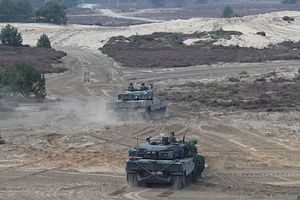Last week, the defense ministers of Germany and Singapore met for a set of scheduled consultations between them. The interaction put the spotlight on the development of the growing defense ties between the two countries amid wider global and regional developments.
As I have observed previously in these pages, while Singapore-Germany defense ties are not new – with aspects including visits, exchanges, dialogues, technological collaboration, and exercises – both sides have been exploring ways to further cooperation in recent years, whether it be in the cyber domain or in new submarines Singapore is looking to add to its fleet with Germany’s assistance.
Last week, the defense aspect of the relationship was in the headlines again with a meeting between the defense ministers from both countries. Singaporean Defense Minister Ng Eng Hen met with German Defense Minister Annegret Kramp-Karrenbauer on the sidelines of the Munich Security Conference – an annual, longstanding high-level security conference – in what was characterized as the first meeting between the two ministers in their current capacities.
Per Singapore’s defense ministry (MINDEF), during the meeting, both sides reaffirmed the state of their growing defense ties, including existing avenues for collaboration such as training for the Singapore Armed Forces and the development of a submarine program. MINDEF also noted that both countries “will also explore new areas of collaboration on cybersecurity and tackling of disinformation.”
No further specifics were provided on what exactly both sides had in mind. But the areas in question are not surprising considering previous discussions as well as agreements signed, including the renewed enhanced defense cooperation agreement inked back in 2018 and a declaration of intent on cybersecurity cooperation covering areas such as information exchanges, joint training and research, and innovation. These are also areas which both sides have been working to tackle domestically as well, which has required managing both opportunities as well as challenges.
The meeting was among a series of interactions that Ng had while at the Munich Security Conference. He also met with other counterparts including Australian Defense Minister Linda Reynolds, Canadian Defense Minister Harjit Singh Sajjan, the President of Kuwait’s National Security Bureau Sheikh Thamer Ali Sabah Al Salem Al Sabah, and Indian External Affairs Minister Subrahmanyam Jaishankar. He also participated in some of the conference engagements as well, including delivering remarks in a roundtable focused on alleviating conflict potential in the South China Sea as well as at a another roundtable for young leaders on building consensus in a divided world.

































